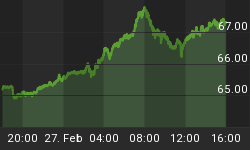Last week, rumors surfaced that China was considering the reallocation of its foreign exchange reserves away from Euros. Although China denied the rumors, China has made changes to its reserve holdings in the past. China's historical willingness to adjust the mix of its currency reserves is a microcosm of the difficult search that people and central banks are undergoing to find a risk-free store of value for their savings.
Earlier this year, we published "Foreign Exchange Reserves Are Concentrated In Weak Currencies". Below are updated figures from that note showing that for several years, China and other countries have been reallocating their foreign exchange reserves away from Dollars and predominantly into Euros. The decrease in Dollars as a percentage of foreign exchange holdings confirms that the Dollar's role as a reserve currency is in doubt. Now that the Euro is also losing credibility, the world is left with few options for safely diversifying its savings.
Figure 1. Total Foreign Exchange Holdings (in millions of U.S. Dollars)
Source: IMF
Figure 2. Composition of Allocated Reserves
Sources: IMF, Continental Capital Advisors
People and central banks hold cash (foreign exchange reserves) for the proverbial rainy day. Although cash can fluctuate in value relative to other assets or goods, the viability of cash should never be questioned. However, central banks are questioning fiat currencies. As such, some central banks have begun to accumulate gold, suggesting that they recognize gold as a trustworthy form of cash (Figure 3).
Figure 3. Largest Increases in Gold Holdings Since 2001 (tonnes of gold)
Sources: IMF, World Gold Council, Continental Capital Advisors
Conversely, Figure 4 lists the countries with the largest decreases in gold holdings since 2001. Many of these countries unwisely sold their gold to buy paper assets, such as sovereign debt, or to fund government deficits. However, gold sales have slowed during the decade, which is further evidence that gold is starting to be recognized as a currency even at the government level.
Figure 4. Largest Decreases in Gold Holdings Since 2001 (tonnes of gold)
Sources: IMF, World Gold Council, Continental Capital Advisors
Historically, risky times meant one should reduce holdings of financial assets while increasing one's cash position. In the past, that form of cash was the Dollar or other paper currencies. Today, risk is prevalent yet both the Dollar and the Euro are in doubt, which leaves few options for preserving one's wealth. As such, the recognition of gold as a form of cash will continue to increase.















